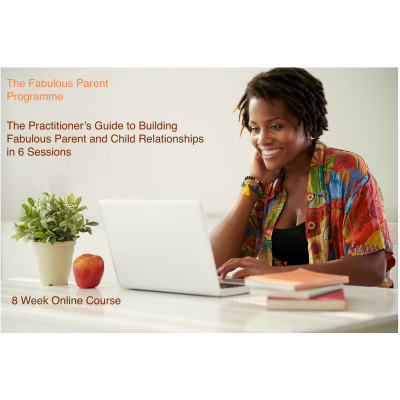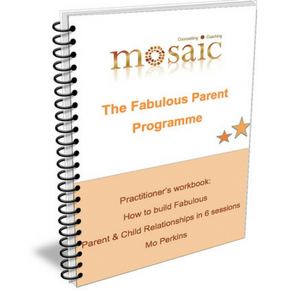Would you like to be even more successful in your work with kids and families? Do you ever feel stuck or as though the work has hit a wall? My favourite metaphor is; it feels like I’m ‘running up a down escalator’. The biggest challenge that faces Therapists and Coaches and the question that I get asked most often is ” How can we maintain the progress that we make in sessions when our work seems to be undone by things happening when children get home?” In fact I often hear; it’s not the child with the problem it’s the parent! I’m not saying there isn’t some truth in this some of the time, but the task we have is . . . How to fix this problem and turn it into a triumph. How to get the escalator going the same way we are?
Fixing the challenge enables us to make even more of a difference to the lives of children and their families. We’ll see greater results in our work and become more confident as we see happier, more resourceful children learning better ways to express their emotions. Furthermore, when you fix the challenge by following my suggestions below a ripple effect happens and the whole family benefits.
So here are 7 ways to fix your biggest challenge when you’re working with Kids.
1. Check Your Mindset
The first step is to check your mindset. If ever you’ve heard that inner voice telling you parents are the problem, challenge that thought. I’m not going to dispute that some parents have problems and that some parents cause problems, however, the amount of time that parents spend with their children is far greater than the time any therapist or coach spends with a child. It’s how the time is spent that makes all the difference. What we do is great but if we empower parents to become involved with the emotional health and wellbeing of their children, the results could be ten times greater. If we change our own mindset and realise that parents are the magic ingredient rather than the problem, we’re on the way to fixing one of our biggest challenges.
Parents are under the gun of mounting economic pressures resulting in long work hours, and often more than one job. Our 24-hour a day culture has created a job market that never goes to sleep, and many parents find themselves working hours outside of the usual nine to five workday. This leaves big gaps in childcare arrangements, especially since the school day has continued to remain somewhere between the hours of 7AM and 4PM. This can be a big problem but it doesn’t mean parents are the problem.
2. Teach Parents how to Deal with Emotional Behaviour
Once we’ve changed our mindset we need to harness the power of the parent – child relationship and help parents to develop the skills they need to make all the difference. Raising kids doesn’t come with a guidebook and we often treat our kids the way we were treated, learn by trial and error and rely on our natural instincts. Those strategies are great when successful but there are also other skills we can learn. Anyone working with kids will have skills for dealing with emotional behaviour in children and anyone who supports adults will have the skills to help people feel heard and understood.
Teaching parents how to deal with their child’s emotional behaviour is an essential strategy towards fixing our challenge. When parents know how to respond to emotional behaviour the work we do in the session can be reinforced and life at home becomes less stressful. When children feel heard and understood, their need to act out is reduced and they become a lot less challenging.
3. Educate Parents about the Importance of Play
Everyone knows that children love to play and need to play but not everyone understands how vital it is for kids, especially up to the age of 10. Children don’t play just to pass the time, they need to play to understand their world, communicate their thoughts and feelings and work out solutions to problems and much more. We’ve all asked children “What’s wrong?” and been greeted by a shrug of the shoulders or a one word answer. Actually it’s not just kids that do that, it’s pretty common behaviour in us grown ups too! To be fair, we’re not always sure what is wrong or why we’ve reacted in a particular way because unconscious processes govern many of our actions.
When parents involve themselves with their child’s play they can learn all sorts of things about the child’s inner world. You don’t have to be a therapist to do this just listen to what the child says and watch what they’re doing and how they’re trying to work things out. The key thing to help parents understand is how to play with the children. Children will express themselves if they feel safe enough. Parents can be shown how to respond and how to take a stance that encourages emotional expression. When we’re encouraging emotional expression it’s not the time for teaching or preaching and it’s the child’s play so they need to lead and the parent needs to follow.
If you work with kids then you know how to play. Don’t keep it a secret or make the mistake of thinking everyone knows what we know, pass your knowledge on to parents.
4. Help Parents Strengthen the Bond with their Child
If you’ve done any reading about the parent-child relationship, you know that the main advice given is that you need to spend time with your children. This is absolutely true and there really is no way to get around this very important step. All relationships are built upon contact that is characterized by caring, dependability, trust, empathy, acceptance, energy, and time. Relationships that are not tended to and nurtured on a regular basis become problematic and eventually erode or break down.
It might seem like common sense but there really is no substitute for parents spending time with their children and the benefit to the work that you’re doing with the child will be noticeable. Many issues that we work with in therapy are linked to a child needing more attention from significant people in their life. Sometimes kids have learned to get the attention they need but by using very challenging methods. When you’re talking to parents about spending time with their child be specific about how much time and how often.
It’s not just about the quantity of time but it’s the quality of the time spent as well. I’m advocating parents spend at least 30 minutes one to one with each child every week. It’s not a lot of time and if you can encourage parents to spend 30 minutes of child focussed time several times a week then that’s even better. However, I find that many parents find it challenging to carve that time out so start by suggesting something manageable like 30 minutes once per week.
5. Recognise the Signs of Stress in Children
Stress is a bit of a buzzword these days and we all feel it from time to time. When the demand on our time and on our personal and emotional resources place too high a pressure on us we feel stress and all of the physical, emotional and behavioural changes that go with it. Children are no different; they feel stress just as much. Their limited life experience, lack of control over their life and the demands of school and peer relationships can be very stressful. The situations that children find stressful can be surprising. It’s no surprise that kids find it stressful if their parents divorce or there’s a death in the family but some people find it more surprising that children get stressed over having to compete on sports day (when it’s meant to be fun), long journeys to school or feeling that they get less favourable treatment than a sibling.
Generally kids don’t say what’s stressed them out, they probably can’t put their finger on it but it shows in their behaviour and impacts on progress in sessions. The more able we are to recognise the situations that stress kids out and the behavioural and emotional reactions they have to stress the better placed we are to provide opportunities to address these issues in our sessions and talk to parents about things that might be happening. Some stresses can’t be changed immediately but acknowledging that a situation is difficult for a child even when they can’t find the words goes a long way to fixing one of the biggest challenges in our work. I’ve written more about the situations that kids find stressful here
6. Support Parents to Understand the Importance of Meeting their Own Needs
Parents really are the magic ingredient when it comes to developing the emotional health and well being of the children we work with. With all the pressures on parents they often feel drained and unable to meet their own needs let alone the needs of their child and all this will impact on the work that we do. Support parents to recognise their own stress as well as their child’s and encourage them to find ways of minimising the impact of stressful situations. Parents often feel judged by professionals and many parents lack confidence and self esteem. One thing that can really help parents is having the person working with their child help them to identify their strengths as a parent. Even in the most challenged of families there will be at least one thing that’s going right. Once we know what’s going well we can encourage parents to do more of that and it’s a stepping stone to making other positive changes.
7. Develop Tools for Coaching Parents
Have several tools and strategies at your fingertips to share with parents to help them deal with their challenges and become even better parents. In the same way we sometimes feel that the situation at home is making our work with kids more challenging just think how our work will become turbo charged if the situation at home helps rather than hinders. Some parents will need a lot more time spent with them than others so it’s really helpful if you have tools at your fingertips that parents can use to look at their strengths, values or stress. When a parent asks how they can help their child, having good advice and something tangible to give them like a simple worksheet will help to get parents on board and help the process. It’s not always enough to suggest parents spend more time with their attention needy child, often you’ll need to be quite specific about how to structure that time and how to respond to various situations.
There will always be challenges in our work with children and times when we feel stuck. The fact that every child is unique is what makes our work so fascinating but ultimately we want to make a difference so being stuck is never going to feel satisfying. Implement the 7 ways to fix your challenges in your work with children and you’ll start to notice things get moving. Of course you need to identify the parents who want to work with you and will co-operate but once you identify that parent you need the knowledge, skills and tools to capitalise on their readiness to take action.
If you’d like to find out more about the ideas in this post or get guidance on how to implement a coaching programme with parents you might like to take a look at The Fabulous Parent Programme: The Practitioner’s Guide to Building Fabulous Parent and Child Relationships in 6 Sessions.
See full story on thesuccessfulparent.com







Excellent resource! Thank you Mo. – B
Thank you Benay